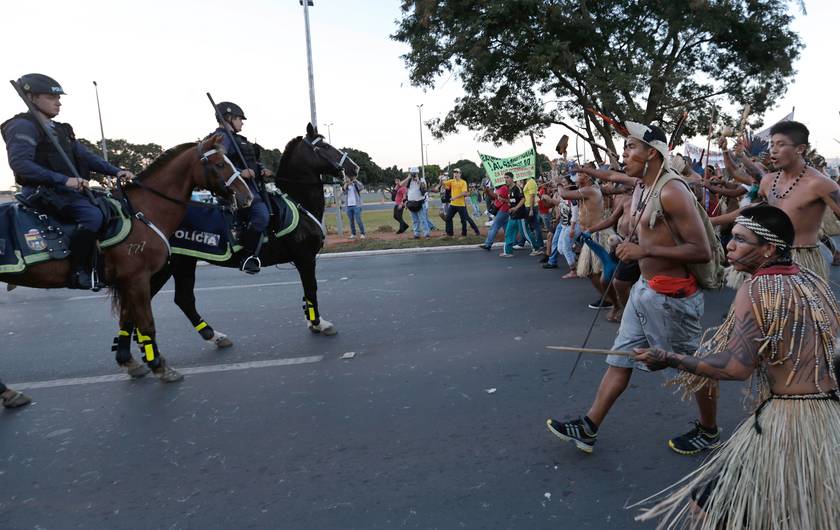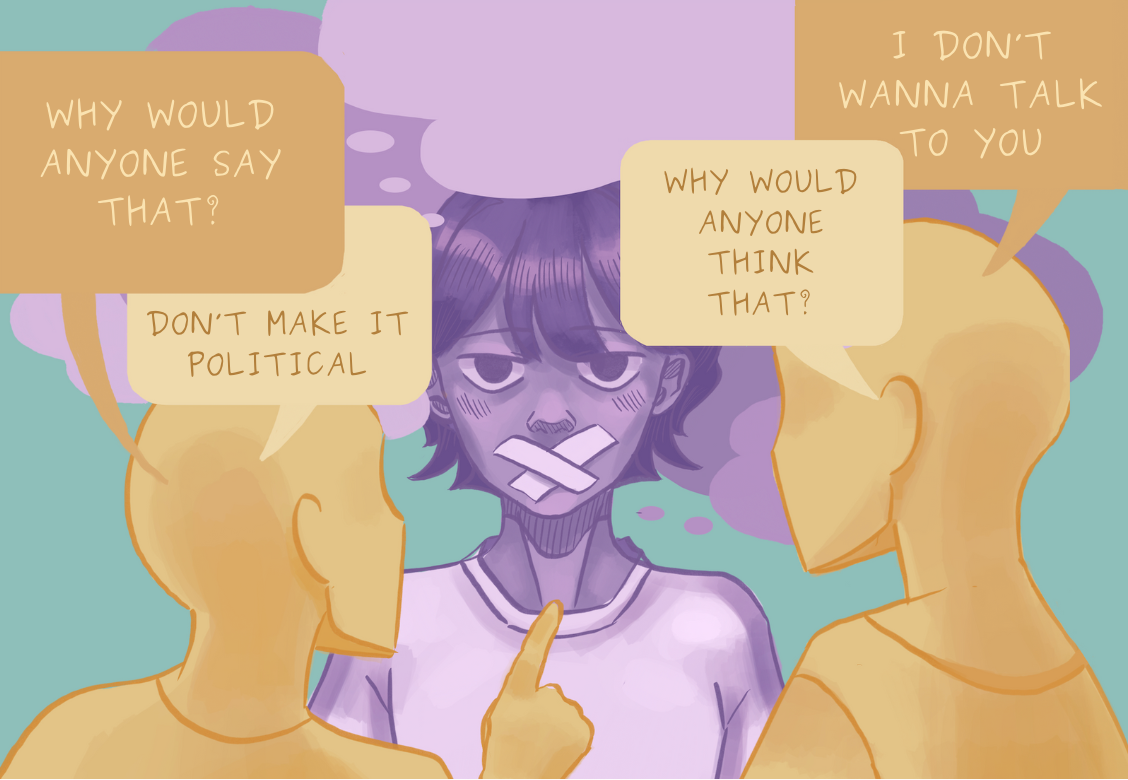Alleged genocide of indigenous people committed by miners
Courtesy of Wikimedia Commons
Indigenous tribesmen of Brazil took to the streets of Brasilia, the capital of Brazil, in 2014 to protest against legislation that they feared would reduce indigenous ancestral land reservations. Ten indigenous tribesmen were said to have been murdered last month by gold miners in Brazil.
October 12, 2017
An investigation is underway into the alleged murder of 10 uncontacted indigenous tribesmen in Brazil by gold miners, who were overheard bragging about the massacre over a month ago.
The incident is alleged to have occurred in the Javari Valley located in the remote west, the second largest indigenous territory in Brazil. The valley contains some of the highest numbers of uncontacted indigenous people in the world, and little information is known about them.
Despite indigenous tribes’ protection under the Brazilian Constitution, there have already been numerous murders of tribesmen this year. Funai, the National Indian foundation of Brazil and government body responsible for establishing policy towards indigenous people, recognizes 14 uncontacted tribes living mostly in the Western Amazon regions of the country.
Upper school Spanish teacher Carmela Tejada, of Peruvian origin, believes that the exploitation of indigenous people has been perpetual since the start of the European presence in South America.
“From the moment the Spaniards came to South and Central America, [indigenous exploitation] has been a pattern,” Tejada said. “That continues today at a different scale, but you can see the peasants work a lot in the Andean region of Peru, for example, and have to work for the landowners, live in difficult life conditions and get little pay.”
These alleged murders come after severe budget cuts to Funai that forced it to close several bases meant to protect indigenous people in the Javari Valley earlier this year.
In a statement released by Amnesty International to the Winged Post, the Indigenous Missionary Council (CIMI), an organization that works to regain indigenous lands and rights, expressed disapproval of the cut funds.
“The Javari Valley has one of the greatest concentrations of uncontacted indigenous people in the world,” the statement said. “By cutting funds for FUNAI, Temer’s government has disorganized and limited the resources the outposts have.”
Illegal gold mining is extremely common in the Northwest Amazon region of Brail. Miners oftentimes use highly toxic mercury to separate gold from dirt.
Mercury, according to a government-backed survey, spread to villages and rivers, creating unhealthy living conditions. Thousands of hectares of jungle have also been cut down as a result of illegal gold mining.
“Recently, the illegal [gold] extraction has intensified in the area around the Indigenous Land Javari Valley, as no state action to prevent or stop such activity was taken,” the same CIMI statement said.
Carl Soderbergh is the director of policy and communications and Minority Rights International, an organization dedicated to making the voices of indigenous peoples heard. He believes that the tribes should simply be left undisturbed but also that it is becoming harder and harder.
“I think the most important principle regarding uncontacted tribes is that outsiders should not initiate contact so that the tribes are left in peace and quiet to live as they will,” Soderbergh said. “It has to be according to their own free will, that they take up contact with the outside world and not that the outside world imposes contact upon them.”
This piece was originally published in the pages of the Winged Post on October 12, 2017.


















![“[Building nerf blasters] became this outlet of creativity for me that hasn't been matched by anything else. The process [of] making a build complete to your desire is such a painstakingly difficult process, but I've had to learn from [the skills needed from] soldering to proper painting. There's so many different options for everything, if you think about it, it exists. The best part is [that] if it doesn't exist, you can build it yourself," Ishaan Parate said.](https://harkeraquila.com/wp-content/uploads/2022/08/DSC_8149-900x604.jpg)




![“When I came into high school, I was ready to be a follower. But DECA was a game changer for me. It helped me overcome my fear of public speaking, and it's played such a major role in who I've become today. To be able to successfully lead a chapter of 150 students, an officer team and be one of the upperclassmen I once really admired is something I'm [really] proud of,” Anvitha Tummala ('21) said.](https://harkeraquila.com/wp-content/uploads/2021/07/Screen-Shot-2021-07-25-at-9.50.05-AM-900x594.png)







![“I think getting up in the morning and having a sense of purpose [is exciting]. I think without a certain amount of drive, life is kind of obsolete and mundane, and I think having that every single day is what makes each day unique and kind of makes life exciting,” Neymika Jain (12) said.](https://harkeraquila.com/wp-content/uploads/2017/06/Screen-Shot-2017-06-03-at-4.54.16-PM.png)








![“My slogan is ‘slow feet, don’t eat, and I’m hungry.’ You need to run fast to get where you are–you aren't going to get those championships if you aren't fast,” Angel Cervantes (12) said. “I want to do well in school on my tests and in track and win championships for my team. I live by that, [and] I can do that anywhere: in the classroom or on the field.”](https://harkeraquila.com/wp-content/uploads/2018/06/DSC5146-900x601.jpg)
![“[Volleyball has] taught me how to fall correctly, and another thing it taught is that you don’t have to be the best at something to be good at it. If you just hit the ball in a smart way, then it still scores points and you’re good at it. You could be a background player and still make a much bigger impact on the team than you would think,” Anya Gert (’20) said.](https://harkeraquila.com/wp-content/uploads/2020/06/AnnaGert_JinTuan_HoHPhotoEdited-600x900.jpeg)

![“I'm not nearly there yet, but [my confidence has] definitely been getting better since I was pretty shy and timid coming into Harker my freshman year. I know that there's a lot of people that are really confident in what they do, and I really admire them. Everyone's so driven and that has really pushed me to kind of try to find my own place in high school and be more confident,” Alyssa Huang (’20) said.](https://harkeraquila.com/wp-content/uploads/2020/06/AlyssaHuang_EmilyChen_HoHPhoto-900x749.jpeg)











